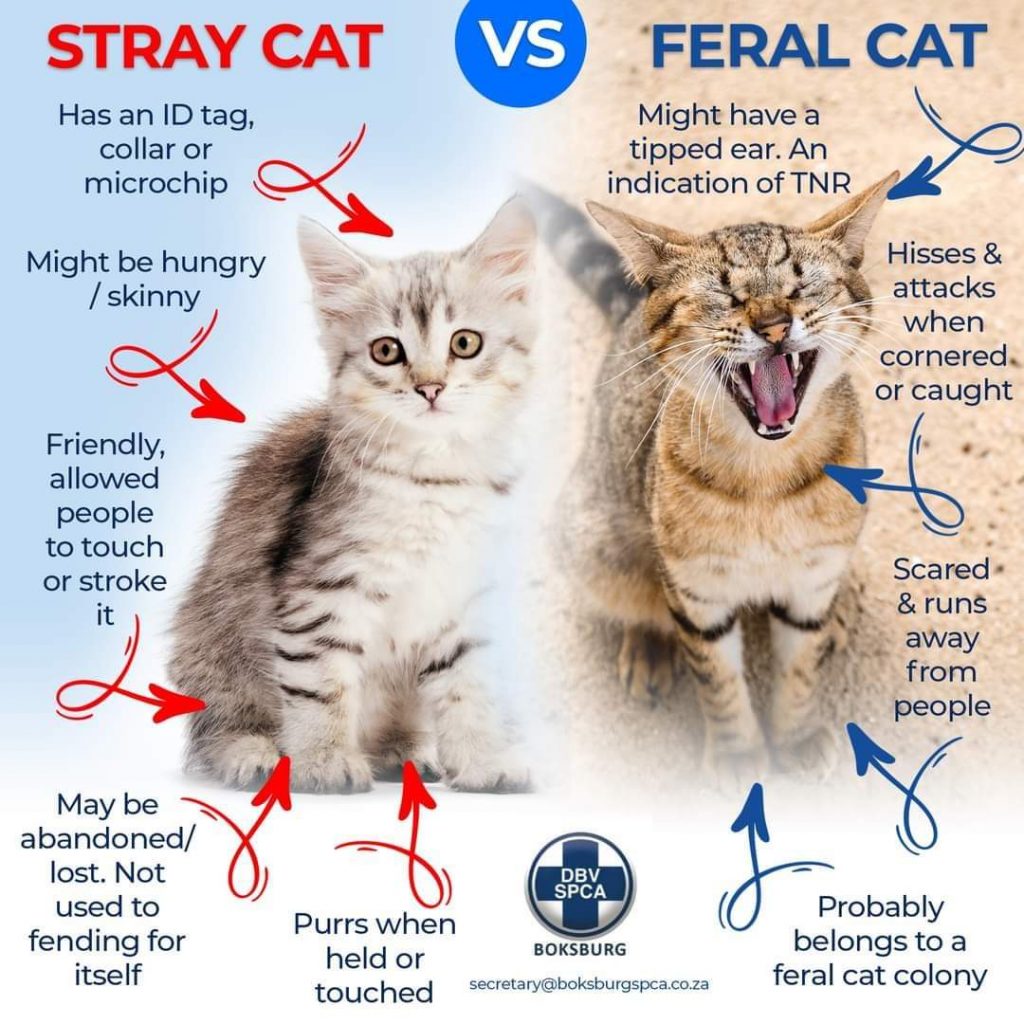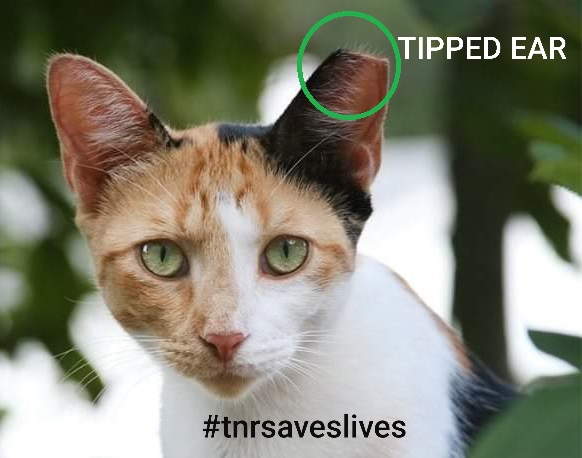
CATS DON’T ADD, THEY MULTIPLY AND THAT IS WHY TNR PROGRAMS FOR FERAL CATS ARE SO IMPORTANT.
Did you know that a cat can fall pregnant at the young age of around 4 months and her 4-6 offspring will repeat this cycle? You can do the math! In 7 years, one pair of unfixed cats and their offspring can produce more than 300 000 kittens! Males can smell the females in heat from miles away. This is also why your unfixed male will walk around.
For most people, a cat is a cat and it is either your cat or someone else’s cat, but feral cats are a special kind! Feral cats may also be referred to as street cats or gutter cats, so first let’s look at the difference between a domestic cat and a feral cat.
DOMESTIC CATS
- has an owner but may be lost or abandoned;
- are often tame and vocal around people;
- will try to make a home near humans in garages, porches, or backyards;
- are reliant on humans for food;
- may look dishevelled since they are not yet able to cope with life on the streets;
- can be seen at all hours of the day.
FERAL CATS
- are born in the wild & are independent beauties;
- are primarily wild-raised or adapted to feral life;
- are quiet and will not approach humans;
- often live in groups called colonies, and take refuge wherever they can find food;
- will wait for humans to leave before eating food that is left out;
- will be more active at night;
- are scared of human interaction;
- will not survive in a caged environment for long;
- they have to fight for survival every day.

INTERESTING FACTS ABOUT FERAL CAT COLONIES
- They live in colonies of which the size & temperament may vary, forming around food sources.
- A matriarchal rule holds for cats which means a female is in charge.
- They are territorial and seldom just let in a newcomer, so you can’t dump a cat with other cats in a colony as they will have to fight for survival.
- Feral cats live in colonies of between 2 – 40 cats.
- A school for example can have 4 separate colonies on its premises and malls easily around 8 different colonies.
- Feral colonies usually start with irresponsible owners who didn’t spay or neuter their cats and allowed them to roam freely.
Because they multiply so fast, it is important to TNR them as soon as possible. It is no easy task, but we can’t just leave it and you can help!
WHAT DOES TNR MEAN?
Trap-Neuter-Release (TNR) is a humane and effective approach to feral cat overpopulation. Grounded in science, it provides many benefits for the cats as well as the community. It is exactly what it sounds like: Cats are humanely trapped and taken to a veterinarian to be spayed/neutered and vaccinated. After recovery, the cats are returned to their home – their colony – outdoors. Kittens and cats who are friendly and socialized with people may be adopted into homes.
Other methods like catch-and-kill, relocation and sanctuaries do not work. It usually creates what we refer to as the “vacuum effect”. The Vacuum Effect is a natural & scientifically-documented phenomenon that refers to, whenever cats are removed, new cats move in, or the surviving cats left behind, breed to capacity.
WHY TRAP-NEUTER-RELEASE?
- Stabilizes feral cat colonies.
- Ends reproduction, no new kittens.
- No vacuum effect.
- Relieves cats of the constant stresses of mating/pregnancy.
- Mating behaviours cease (roaming, yowling, spraying & fighting).
- Colony size diminish.
- Improves cats’ lives.
- Protects cats’ lives.
- Puts an end to the futile catch & kill approach.
- Serves animals & community.
- Efficient, compassionate & socially-responsible approach.
- Cat’s physical health improves.
- Risk of illness and cancers decrease.
- Sick cats can be treated & they are vaccinated against Rabies.
- Cats become better neighbours because they become quieter.
- Creates opportunities for outreach, education & cooperation.
- Other methods just don’t work.
TIPPED EARS – BADGE OF HONOR!
During the spay/neuter process the ear is tipped humanely, so we can recognize the cats. A tipped ear is a worldwide accepted way to signify that a cat has been spayed/neutered and is cared for.

Feral Watch & TNR is a registered non-profit company (NPC 2020/065177/08) with PBO number 930070126. The organization was founded in 2018 after being a branch of Feral Care Friends since 2016. They run operations mainly in and around the Highveld Ridge area which has a large population of feral cats that reside in this area. Their main focus is to establish cared for, controlled & healthy feral cat colonies. They are a pro-life & pro-sterilization organization. This means that they do not euthanize healthy animals. Contact them via their website, Facebook or on 082 781 9435 about any feral cat concerns or to make a difference!
IMPORTANT
- Never just remove kittens unless they are injured or in imminent danger, contact Feral Watch & TNR first to advise you. Sometimes the mother is moving the kittens and that is why they appear abandoned.
- As temperatures are still low or even in stormy weather please remember that feral cats (or domestic cats) may find shelter for themselves or their kittens in and under your car. This is a reminder to tap on your hoods & wheels and blow your horns to let them get out. You can tap and stand back for a while, but still check as well! This happens often and just a while back another cat died of engine burns. Please take that extra minute before starting your car and save a life. Also, remember that feral cats are not used to cars, so don’t expect them to just move out of the way when you drive.
- If you work at the mines, at any other business or school or even in your street where there are feral cats, please advocate for these cats so that they are not removed and killed! If you are feeding a colony, you need to have a plan to TNR them. If you tame them, you need to take responsibility for them.
Also read about what kinds of foods can your dog eat.
All animals deserve compassion including the street cats who were failed by humans! Support TNR programs by responsible and compassionate organizations, spay & neuter your cats and keep them safe in your yard.
Next week we will look at pets and allergies.
WHEN YOU KNOW BETTER, DO BETTER!